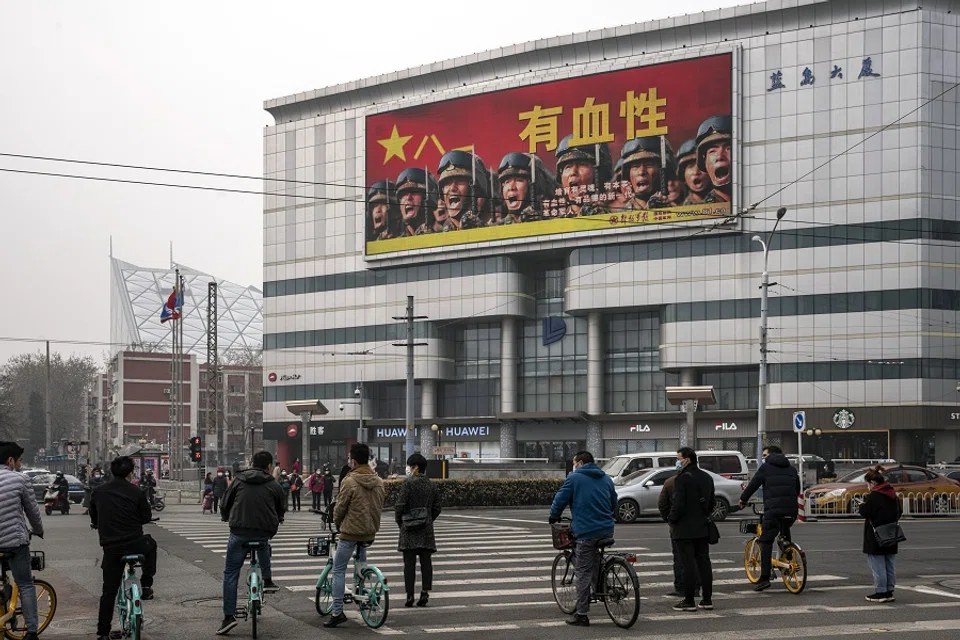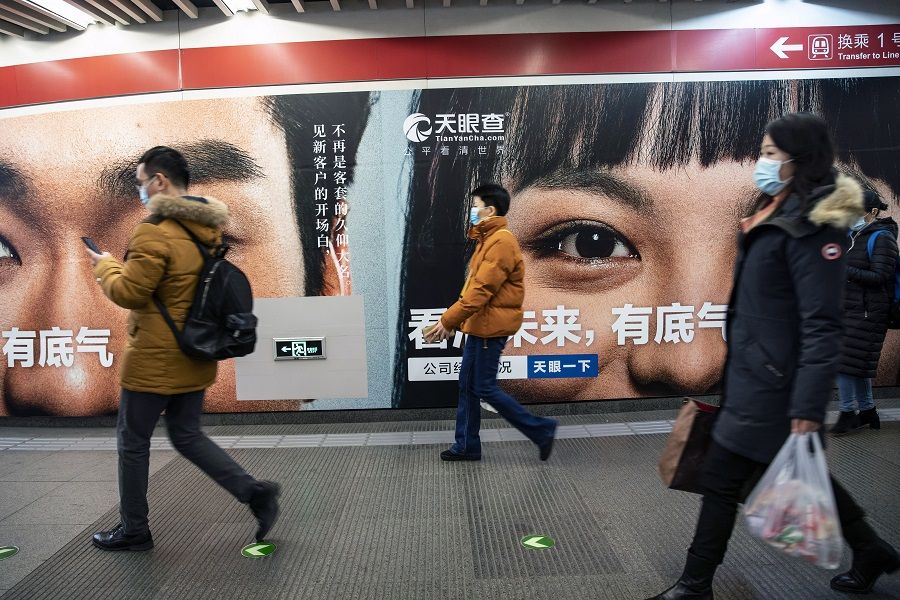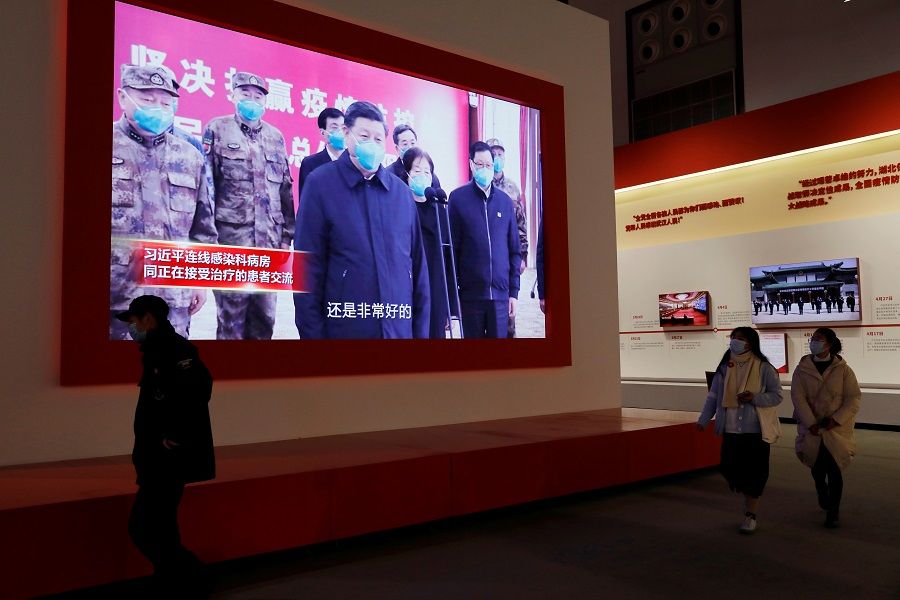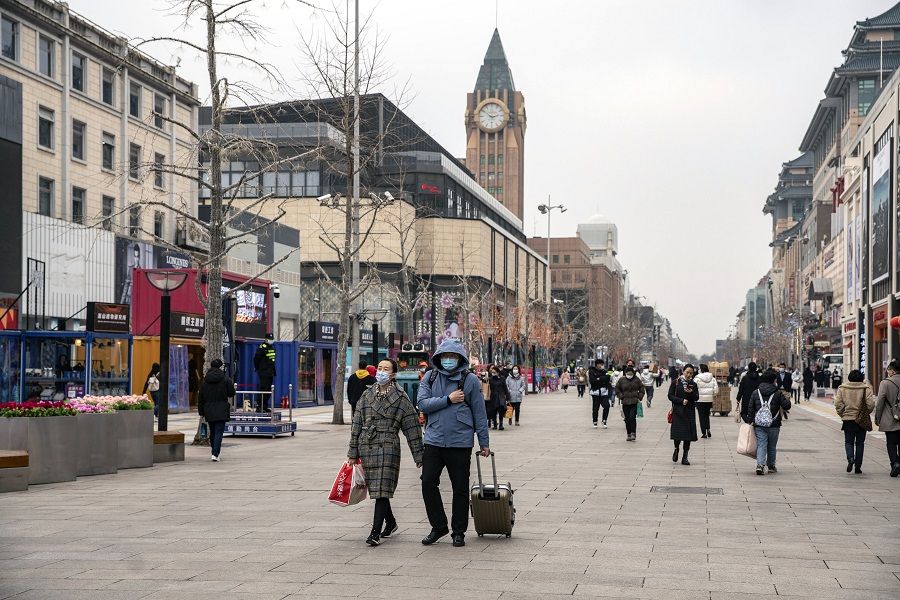China-US strategic showdown: Will the east wind prevail over the west wind?

Where is history heading? The answer to this question represents the most profound, far-reaching and significant consequence of the strategic rivalry between the two mightiest countries today. China upholds its Communist Party-led socialist system steadfastly, whereas the US stands by the democratic liberal system - or, as China calls it, a capitalist system - it has always had. The 21st century sees the convergence of the Chinese socialist system and its American capitalist counterpart across the global arena, and that convergence is a critical turning point in history.
There are three points to note. Firstly, the two countries each have their own narratives about this turning point. "The world is undergoing profound changes unseen in a century", according to China's leader Xi Jinping. Or, as US President Biden puts it, "we are at an inflection point" and "historians are going to examine and write about this moment as an inflection point". Xi points out that China offers the world a different option, a model by which countries may jointly build a "community of shared destiny for mankind". Biden, on the other hand, says, "We have to prove that our model isn't a relic of our history; it's the single best way to revitalise the promise of our future." Xi Jinping declares confidently: "Time and momentum are on our side." With equal confidence, Biden asserts: "Democracy will and must prevail."
The above-cited words of Biden are from his speech given on 19 February at the Munich Security Conference. He did not call China an autocratic regime on that occasion, yet his "inflection point" is construed by Western media in terms of a contest between democracy and autocracy. Has Western media distorted what Biden meant? We need only refer to the US president's foreign policy speech delivered on 4 February at the State Department, in which he said, "American leadership must meet this new moment of advancing authoritarianism, including the growing ambitions of China to rival the United States, and the determination of Russia to damage and disrupt our democracy." By setting up the dichotomy of autocracy and democracy, Biden is doing the same thing as what the Trump administration did, which was to paint a picture of the Chinese Communist Party (CCP) versus the free world.
A tussle between the Chinese and American systems
The historic turning point spoken of by both Xi and Biden essentially concerns the tussle between the Chinese system and the American system. It is an important juncture that will determine which of the two shall emerge victorious. What is happening is the reenactment of a decisive battle between the socialist and capitalist system of mankind. After the crushing defeat of the Soviet Union in the Cold War, the mission of reviving the communist movement had fallen to China. What better way of remembrance is there than the current development for the 100th anniversary of the founding of the CCP? That the party has not forgotten its original purpose is thus gloriously highlighted.
With hard power, China confirms that America is in decline. And I mean not relative decline, but absolute decline.

The second point to be noted is that the historic turning point is upon us because of the rise of China and the relative decline of America. The two countries are on the centre stage of this momentous inflection. The rise of one great power and the relative decline of the other have shattered the post-Cold War overconfidence of the West in democracy. History did not end. The path China took through the market economy did not lead to a democratic society recognised by the West as such. When the Trump administration took punitive actions against China, it signalled the Western society's disillusionment with the imagined democratisation of China. Things have turned out differently. Standing strong on its foundation of a population of 1.4 billion, China has built a formidable "Chinese power" with its combination of strong government leadership and the market economy.
Grounded on economic strength, "Chinese power" extends to the military and technological domains. "Chinese power" is material power - that is to say, hard power. With hard power, China confirms that America is in decline. And I mean not relative decline, but absolute decline. The understanding that America's absolute decline is being confirmed by China first emerged in the Chinese academic circles. In his book America Against America published in 1991 when he was an academic, Wang Huning, now one of China's top leaders and a member of the CCP's Politburo Standing Committee said, "Generally speaking, the American system is built on individualism, hedonism and democracy, and it is clearly losing to systems based on collectivism, selflessness and authoritarianism."
It was America's 2008 financial crisis that convinced China of the Western superpower's deterioration. In November 2018, Yan Xuetong, dean of Tsinghua University's Institute of International Relations, thought that the CCP was in the middle of its best strategic opportunity since the end of the Cold War. In March 2019, Professor Wang Xiangsui of Beihang University made an illuminating claim during a seminar: the "profound changes unseen in a century" refers to a major global shift - that is to say, the West, represented by the US, and the global system led by America are coming to an end, whereas China (or emerging countries of the East and South) are on the ascendant. That is exactly what we are seeing in the world today.
The coronavirus pandemic of 2020 proved to be a precise strike on the weak spot of Western democracy. There is a video entitled "China May Become the World's Biggest Winner After the Pandemic", which is part of China's efforts to publicise the superiority of its system. It proclaims: "As far as deterrence power is concerned, China has taken advantage of the present pandemic to successfully demonstrate its own capacity for mobilisation to the rest of the world. Many countries are awed by China. The goal of subjugating foreign armies without military conflict is thereby achieved." Through the "China Screen" rented at New York's Times Square, the Xinhua News Agency is showing to Americans the positive results of the Chinese counter-pandemic efforts, 24 hours a day, day after day. China has given aid to more than 80 countries and territories around the world to combat Covid-19.
Emboldened by its own expectations of America's downward spiral, China takes "highly aggressive positions".

That the East is rising and the West is waning is the prevalent view in China's public opinion. We are reminded of how some thoughts expressed by Chen Ping, an adjunct professor at Fudan University's School of Economics, had sparked controversy. He said in a speech that although one might earn only 2,000 RMB (less than US$1,000) a month in China, life was much happier in his country than it would be in America even with three times the income. Americans are actually living in very difficult times now. It is very simple: there is hardly any public transport in their country. On 17 February, Chen Ping mused in an online post about a seven-hour power outage at where he currently resides (a high-tech district in Austin, the capital city of Texas). The crisis occurred on 15 February due to the sudden arrival of snowy weather more severe than any seen in decades.
Up to America to show the longevity of democratic system
It should be pointed out that the US knows that China thinks of it as withering. Julian Gewirtz, director for China in the Biden administration's National Security Council, wrote the article "China Thinks America is Losing" in a 2020 issue of Foreign Affairs.
According to Gewirtz, China's leaders have firmly believed for a long time that the US is inexorably declining and its decline has led it to seek to contain China's development. Supposedly, the various actions of the Trump administration have further reinforced this judgement on China's part. Emboldened by its own expectations of America's downward spiral, China takes "highly aggressive positions", Gewirtz goes on to say, "imposing a new national security law on Hong Kong; committing atrocities in Xinjiang; bullying Australia, India, and the Philippines; threatening Taiwan; forging new partnerships with Iran and Russia; and letting Chinese diplomats spread conspiracy theories about the origins of Covid-19", all with no fear of international censure.
... which way history will turn now depends on whether or not America can prove the strength of the democratic system.

This takes me to my third point: which way history will turn now depends on whether or not America can prove the strength of the democratic system. In the eyes of the Chinese mainstream, the superiority of the Chinese political system has been proven by China's economic achievements. Of course, there is a minority of Chinese intellectuals who believe that such achievements are accounted for by the triumph of the market economy. That is why the famous essay "What Did Deng Xiaoping Do Right?", written by the economist Zhou Qiren many years ago, continues to be spread around on the Internet. However, the chaos of the US presidential election has given another shot in the arm to the Chinese belief in America's decline and in the superiority of the Chinese political system. The said superiority outweighs that of the market economy per se. Hence, America now needs to prove itself.
As pointed out by Gewirtz, what his country needs to do is to prove to China that "the United States remains strong and can reliably revive the sources of its power and leadership". In addition: "Nothing is as important to competing effectively with China as what the United States does at home, revitalising its economic fundamentals, technological edge, and democratic system." Most recently, US Senate Majority Leader Chuck Schumer said that America needs to maintain its lead in technology to "out-compete" China. Schumer is nevertheless only half right. America has to prove in actual fact that it does have the technological edge indeed.
Change begins at home
What America needs to do is "getting [its] own house in order". These are the actual words of Jake Sullivan, the new national security adviser of the US. According to him, in order to deal with China and various other challenges, America needs to establish a position of strength, so that the US model of democracy may continue to shine. The establishment of such a position of strength (as Sullivan puts it) cannot happen unless the Western superpower does a good job on the home front first. Only by fulfilling this condition can the greatness of democracy be proven. Only then may the beacon of democracy keep shining and America continue to lead the world. Otherwise, it's all just vain talk.
...if the US is to prove the superiority of its democratic system, it must not use democratisation as an excuse to cover up how it has missed development opportunities through inefficient decision-making.
The rebuilding of infrastructure is an indicator of whether America can do a good job at home. During a meeting held on 11 February about infrastructure investment, Biden said that China is "going to eat our lunch" if the US continues to take no action. But here's the thing: the Trump administration had also wanted to rebuild America's infrastructure. In 2018, Donald Trump proposed that US$200 billion be expended over ten years as a stimulus for US$1.5 trillion worth of mainly private-run infrastructure projects, but the matter was never put to a vote at the US Congress. Before Trump left office, his administration drafted a trillion-dollar infrastructure spending plan. In the end, that plan was never even publicly released.
There we have it, the ammunition for China scoffing at American democracy. The low efficiency of the American democratic system stands in sharp contrast to, for instance, how the Chinese government made decisions for developing the Xiong'an New Area in Hebei and executed them. Sure, the remarkable efficiency of an authoritarian system often comes with the potential risk of tremendous losses due to erroneous decisions; but the thing is: if the US is to prove the superiority of its democratic system, it must not use democratisation as an excuse to cover up how it has missed development opportunities through inefficient decision-making. China's accomplishments in infrastructure building, on the other hand, has amazed the world. The Belt and Road Initiative represents the outward extensions of the country's infrastructure. It is with actual strength that China vies with the US for world leadership. China is, for example, working with a Russian company to build a high-speed railway line between Belgrade and Budapest, for which Serbia is financed with a billion US dollars. The project will put an end to the way things have always been for Serbian trains - i.e., that they have never travelled above an average speed of 50 kilometres per hour. Serbia will naturally be grateful to China.

Just how is the US going to seize leadership from its foremost rival? In 2019, the Centre for Strategic and International Studies, an American think tank, released a report entitled "The Higher Road: Forging a US Strategy for the Global Infrastructure Challenge", in which America was called upon to become the global infrastructure leader through building infrastructure of higher quality. In November of the same year, US Commerce Secretary Wilbur Ross unveiled the Blue Dot Network initiative, set to maintain international standards for big infrastructure projects all over the world. As recently as 17 February, an opinion piece by former US Secretary of the Navy Jim Webb in the Wall Street Journal urged the Biden administration to launch "an American Belt and Road Initiative", so as to counteract China's international influence. These are great ideas, but this is all talk and no action if the US does not execute concrete plans.
The key to America reviving its world leadership still comes down to getting things done properly on the home front. A 2020 article in Foreign Affairs, entitled "American Leadership Begins at Home", makes it clear that America's being on top in the global arena is grounded "not only in the power of our ideals but also in the power of our example". The latter power includes "harnessing resources and delivering solutions for citizens". The article goes on to note that American leadership is being tested by the coronavirus pandemic; "effective governance and a flourishing democracy at home are the foundation of American leadership in the world". It reiterated that "the greatest challenge to liberal democracy today" comes from "domestic dysfunction".
Vaccine diplomacy
The Biden administration fully understands that America's world leadership is based on actual strength. And what more prominent stage is there than Covid diplomacy, whereby great nations may show their clout? When China's medical teams provided medical aid in Serbia, the Serbian president Aleksandar Vucic publicly and passionately kissed the Chinese five-starred red flag. Why didn't the US help Serbia out? And then there is Hungary, which began using Sinopharm's Covid-19 vaccine on 24 February. The Hungarian Prime Minister Viktor Orban once again criticised the EU's process of vaccine approval and procurement for being too slow. Does the US have any vaccine to give to Hungary? No. It is only natural that Hungary is grateful to China.
Hanging in the balance in direct connection to this outcome is the fate of humanity in the 21st century.

By 21 February, China has donated over three million doses of vaccines to more than ten countries. Even India has donated over six million doses to neighbouring countries. In contrast, most Western countries have yet to make any direct vaccine donation to date. Worse still, they purchase the vaccines in enormous quantities and hoard them domestically. As disclosed by the World Health Organization's Director-General Tedros Adhanom Ghebreyesus recently, while more than 39 million doses of vaccines have been administered in 49 affluent countries, only 25 doses have been administered in one lowest-income country. China has pledged to provide 400 million doses of vaccines around the world through its companies, of which more than 200 million were ordered by Indonesia. America's vaccine diplomacy in Southeast Asia, on the other hand, is practically non-existent. Just where is America's world leadership now?
But, of course, it is still too early to assert that America has failed. The pivoting of history is still ongoing. The whole world has its eyes peeled for the outcome of the China-US strategic showdown. Hanging in the balance in direct connection to this outcome is the fate of humanity in the 21st century. As the Chinese saying mentioned by the great leader of the Chinese people Mao Zedong goes, either the east wind prevails over the west wind, or the west wind prevails over the east wind.
Related: Vaccine diplomacy: China and India push ahead to supply vaccines to developing countries | America's flawed democracy: When power and cognitive abilities of the people fail to match | Can the CCP forge an inclusive social contract and build a healthy civil society? | Why Biden will continue the trade war with China to the 'end'
